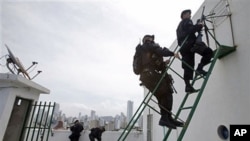Economic integration and violence fueled by the illegal drug trade top the agenda as 33 North American, Latin American and Caribbean leaders participate this Saturday and Sunday in the sixth Summit of the Americas. U.S. President Barack Obama is to arrive Friday in Cartagena, Colombia.
Three years after Obama attended his first summit in Trinidad, where he pledged to re-focus the United States on building equal partnerships in the hemisphere, Latin America is undergoing dramatic change.
It is the fastest-growing trading region for the United States, and includes economic powerhouse Brazil, now the world's sixth largest economy. It is also a region in which China and Europe compete with the United States for influence and investment opportunities.
Democracy has generally strengthened in the Americas, but faces challenges. Some new political blocs have emerged, including countries such as Venezuela, Ecuador, and Bolivia that seek to exclude the United States and Canada.
Council of the Americas vice president Eric Farnsworth said the United States is still seen as having the most influence, but there is also disappointment.
"There was a huge anticipation, expectation that the U.S. would fundamentally change policy towards the region, but those expectations were unfounded and indeed many people in the region were disappointed that things did not change overnight from traditional U.S. approaches to the hemisphere," said Farnsworth.
Colombia's President Juan Manuel Santos hosts the summit, which has the official title of "Connecting the Americas: Partners for Prosperity."
Poverty reduction and inequality, citizen security, integration through improved infrastructure, technology, and natural disasters are on the agenda.
National Security Council Senior Director for Western Hemisphere Affairs Dan Restrepo said Obama will speak about remaining challenges to democracy.
“I think you will see the president talking about and encouraging his fellow leaders to similarly respond to this shared commitment we have to democratic governance in the Americas,” said Restrepo.
There will be debate behind closed doors about how to deal with violence driven by the drug trade. The United States and Canada face pressure to consider alternatives to what some Latin American leaders consider a failed “war on drugs.”
The United States opposes drug decriminalization, preferring to step up military and security aid and intelligence coordination.
"The idea that this was a settled matter and that basically the policies in place, with some tweaks, could be made to work better than they have over time, that no longer flies," said John Walsh, senior associate for drug policy at the Washington Office on Latin America.
Absent from the summit will be Cuba, which does not meet the democratic requirements of the Organization of American States (OAS).
Analyst Alexander Main, of the Center for Economic and Policy Research, said there is disappointment in the hemisphere regarding U.S. policy on Cuba.
"There were some initial changes and inflection in U.S. policy when President Obama signed a law that called for easing travel restrictions to Cuba, but then not much was done after that," said Main.
Stephen Johnson of the Center for Strategic and International Studies said hemisphere leaders need to nudge Cuba toward political reform.
"It is incumbent on Latin America’s leadership that has relations with Cuba to be encouraging to Raul [Castro] to go farther than just some of the economic reforms that have begun to transform the economy there - to include a move to open up the political system," said Johnson.
Venezuela's president Hugo Chavez, who has an antagonistic relationship with the United States and close ties with Iran, is expected to attend, though he is battling cancer.
Deputy National Security Adviser for Strategic Communications Ben Rhodes said Chavez is among those focused on re-igniting past debates rather than on the future.
“We will continue to look forward to the future we are trying to forge rather than re-visiting the ideological battles of the past as some leaders seek to do,” said Rhodes.
This is the president's fourth trip to Latin America since he took office. Despite remaining skepticism by some about U.S. commitment, White House officials say he has strengthened the U.S. image in a region crucial to economic recovery and job growth.
News
Summit of Americas to Spotlight Drug Violence, Development
- By Dan Robinson





